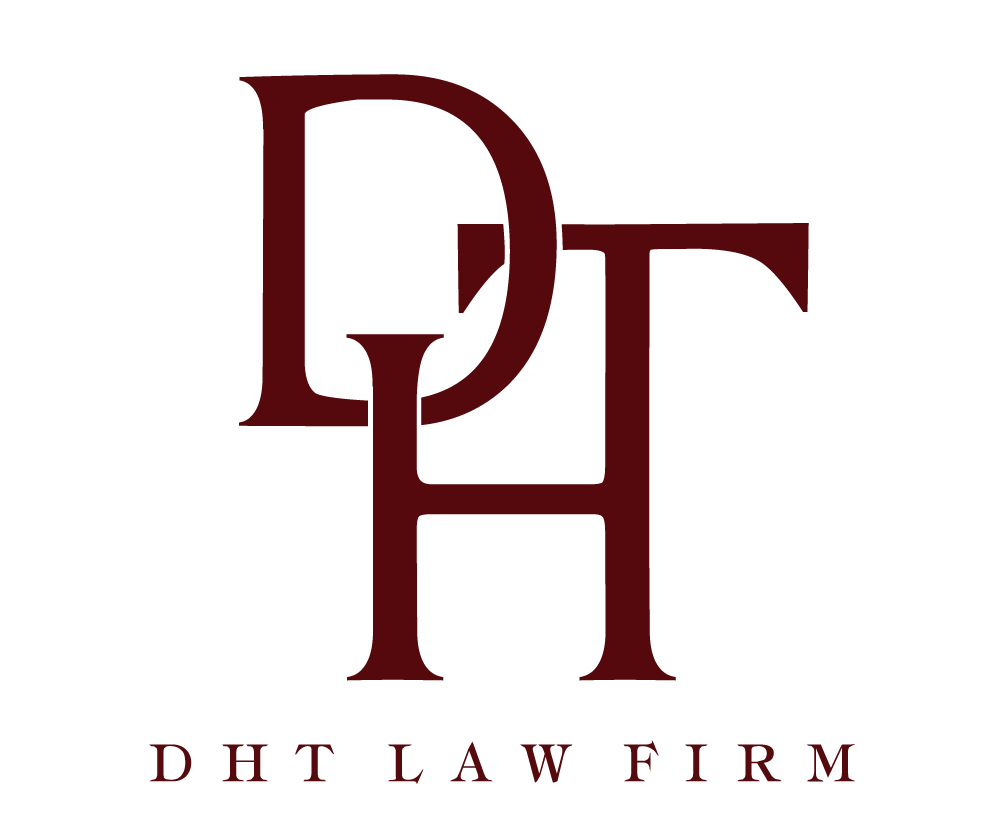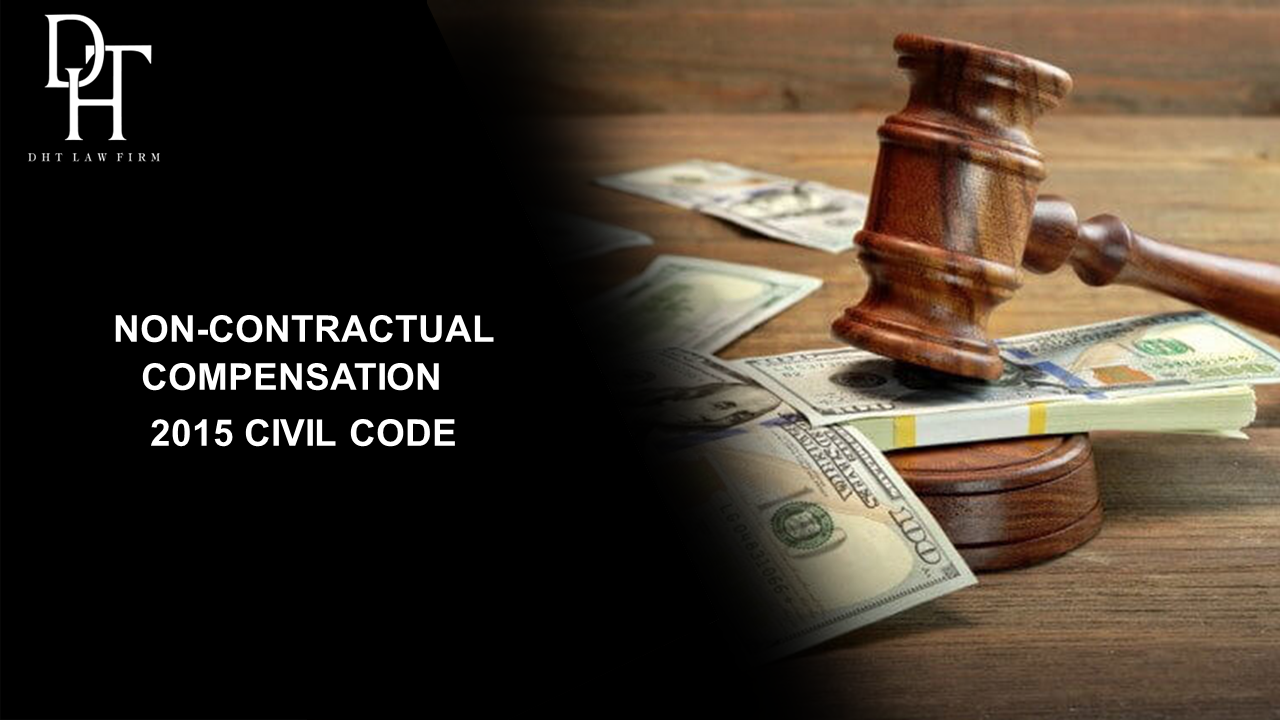
REGULATION ABOUT LIABLITY FOR NON-CONTRACTUAL DAMAGE ACCORDING TO 2015 CIVIL CODE
- Overview of compensation for non-contractual damage
1. Contractual damage compensation and Non-contractual damage compensation
Liability to compensate for causing damages in a contract is a civil liability arising from failure performance or improper performance obligations under a contract. This liability’s feature is both parties (one who caused damage and one who is the victim) must have signed a contract, and damaged must be caused by acts of a failure performance or improper performance of obligations.
Whether the two parties have a contractual relationship or not, in case there is loss of health or life, in practice, the liability to compensate for non-contractual damage is applied. A life of a man is invaluable, it can not be calculated with money, and when it is violated, the person causing the damage must compensate. However, this compensation is only to limit and overcome to a minimum the economic losses that have occurred to relatives and close friend of the aggrieved person but can not remedy the consequences that have occurred because when life has been taken away, the victim has lost everything.
2. Bồi thường thiệt hại ngoài hợp đồng và trách nhiệm hình sự
Liability for non-contractual damages is different from criminal liability. Liability to compensate for damage outside the contract applies to all individuals, legal entities and other entities, but criminal liability applies only to commercial individuals or legal entities.
II. Regulation of compensation for non-contractual damage
- Basis of liability for compensation for non-contractual damage
According to Article 548 of 2015 Civil Code, liability to compensate for non-contractual damages is only mentioned when the subjects have violated their civil obligations and have actually caused damage to other subjects. There must be four elements to form a liability for damages:
First, damaged must occurred. It is the premise of liability to compensate for non-contractual damages. Since the main purpose of the compensation is to restore the the property to the aggrieved person, thus the absence of damaged property does not raise the question of compensation even if other conditions are met. Damaged are actually loss caculated in cash due to infringing upon the life, health, honor, reputation and property of an individual or legal entity.
Second, acts that cause damage must be illegal acts. Illegal acts are acts that prohibited by laws and regulations due to their dangerousness to society. Damage-causing acts may be criminal, civil or administrative violations, even including those that violate the lines and policies of the leading Party and State, or rule of each community.
Third, there must be a cause-and-effect relationship between damaged and illegal acts. This relationship manifests illegal acts must precede and be the cause leading to damage occurring, and damage must be done after, which is the result of the previous illegal act.
Forth, the fault factor of the person causing the damage. Previously, according to the provisions of Article 604, the 2005 Civil Code, the person causing the damage had to be responsible when they were at fault. Currently, in Article 584 of the 2015 Civil Code, there is no direct mention of the error issue. However, through the study of the general provisions on compensation for non-contractual damages, the provisions on compensation principles and compensation capacity of the Civil Code 2015 still show that fault is a condition constituting compensation liability. usually non-contractual damages.
From the above, it follows that the liability to compensate for damage outside the contract arises when the following conditions are met:
- Damage or loss occurred
- The act of causing damage is an illegal act
- There is a cause-and-effect relationship between the illegal act and the damage that occurs.
- There is an intentional or unintentional fault of the person causing the damage
A person causing loss and damage is not required to be responsible to compensate for loss and damage arising and caused by an event of force majeure or due entirely to the fault of the aggrieved party unless otherwise agreed or provided by law.
- Principles of compensation for loss and damage
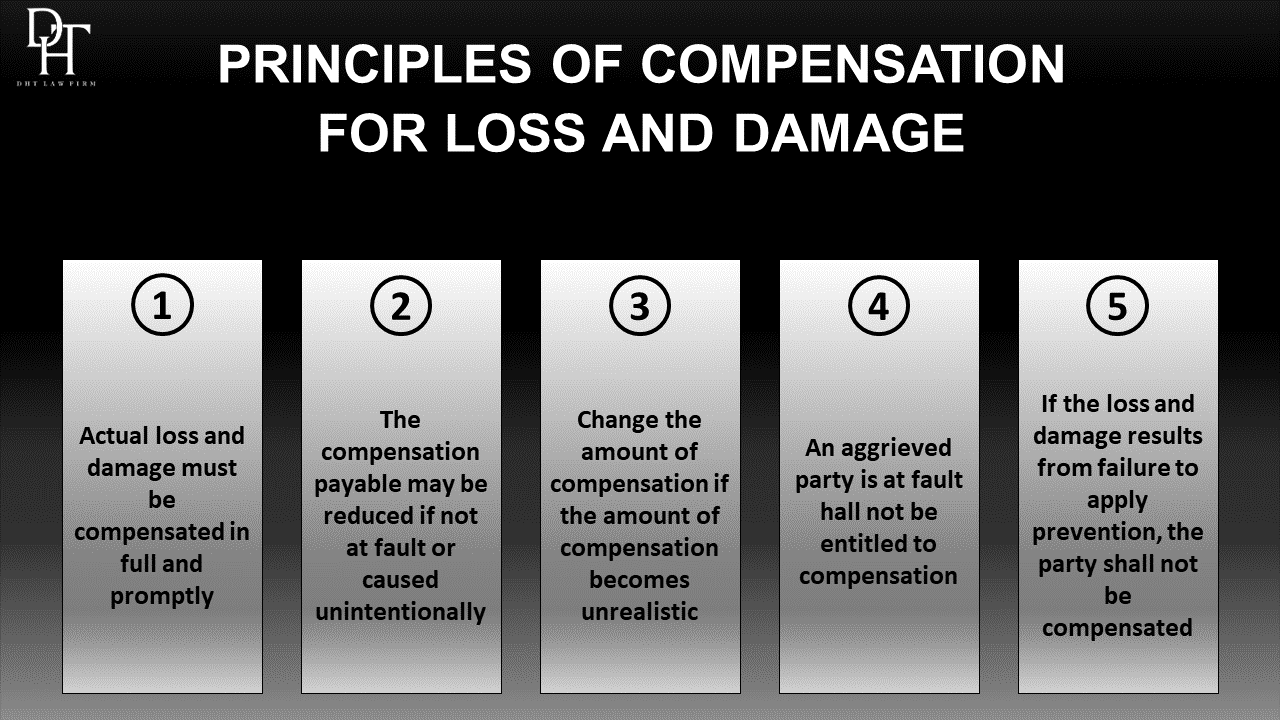
Compensation must follow principles following Article 585 of 2015 Civil Code :
First, actual loss and damage must be compensated in full and promptly. Unless otherwise provided by law, parties may agree on the amount of compensation; on the form of compensation, which may be money, in kind or the performance of an act; on one-off payment or payment in installments; and on the method of compensation.
Second, the compensation payable by a person who is responsible for compensation for loss and damage may be reduced if such person was not at fault or such loss and damage was caused unintentionally and is very large in comparison to the financial position of such person.
Third, tf the amount of compensation [determined] becomes unrealistic, the aggrieved party, or the party having caused loss and damage, has the right to request a court or another authorized State body to change the amount of compensation.
Forth, where an aggrieved party is at fault for causing loss and damage, such party shall not be entitled to compensation for the part of the loss and damage arising from its fault.
Last, A party with infringed rights or benefits shall not be compensated if the loss and damage results from failure to apply necessary and reasonable measures to prevent or mitigate the loss and damage to such party
- Capacity of individuals for liability to compensate for loss and damage
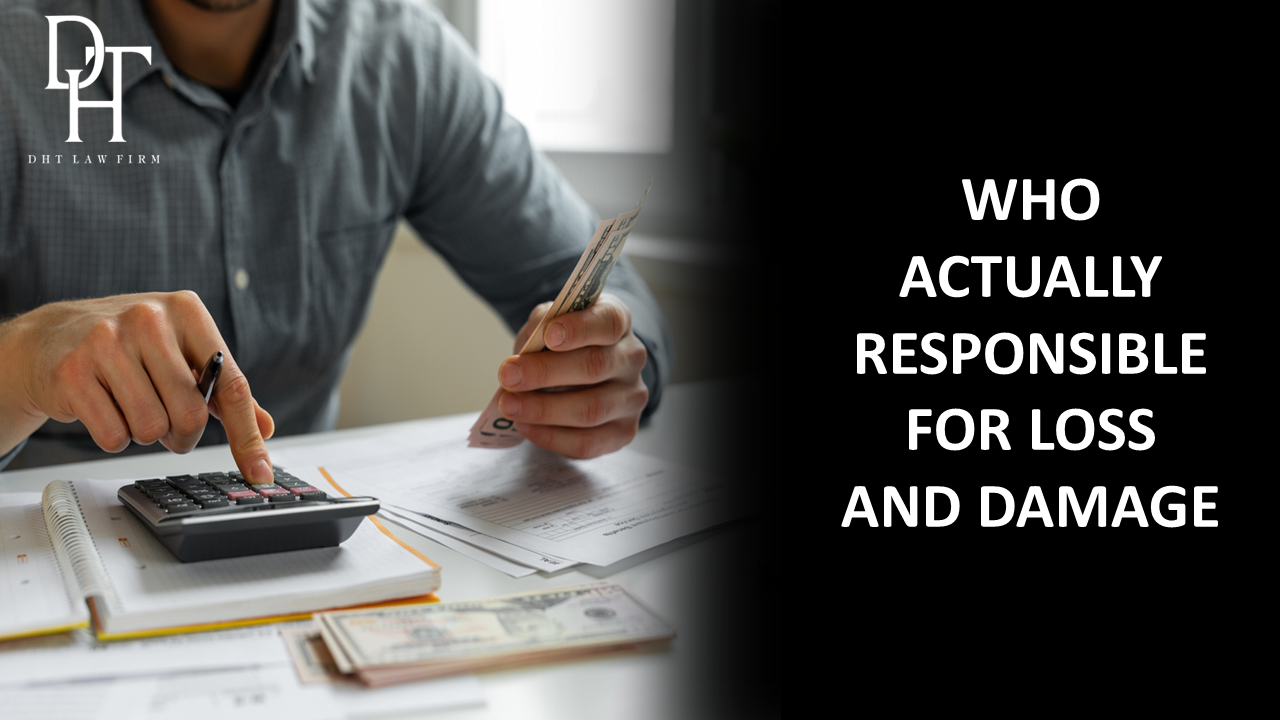
According to article 586 and 599 of 2015 Civil Code, a person of 18 or more of age must compensate for the loss and damge he or she caused. However, where a person under fifteen (15) years of age causes loss and damage, their parents, if any, must compensate for the total loss and damage. If the parents have insufficient property to compensate and the minor who has caused the loss and damage has property of his or her own, such property shall be used to satisfy the outstanding amount of compensation,
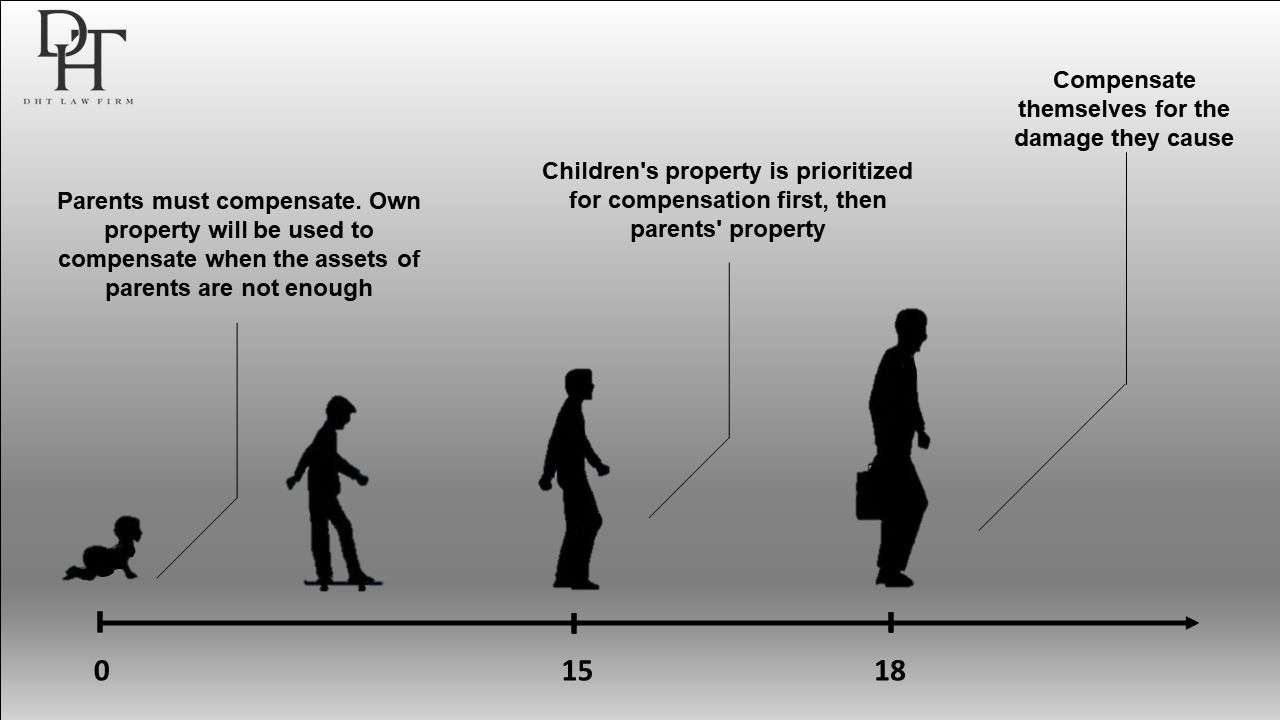
Where a minor, or a person who has lost the capacity for civil acts, or a person having difficulties in being aware of, or controlling, his or her own acts causes loss and damage but there is a guardian, such guardian shall use the property of the ward to compensate. If the ward has no or insufficient property to compensate, the guardian must do so by recourse to the property of the guardian. If the guardian is able to prove that he or she was not at fault with respect to guardianship, the guardian shall not be required to use its property to compensate.
- Compensation for loss and damage caused jointly by several persons
As written in Article 587 of 2015 Civil Code, where several persons cause loss and damage jointly, they must compensate any aggrieved person. Liability for compensation of each person having jointly caused the loss and damage shall be determined in proportion to the degree of fault of each person. If the degree of fault is not able to be determined, the persons causing loss and damage must compensate in equal shares.
The limitation period for initiating legal action claiming compensation for loss and damage shall be three years from the date on which the person with the right to make the request knew or should have known that his or her legal rights or interests were infringed, which is written in article 588 of 2014 Civil Code
Assessment of Loss and Damage is provisioned in articles 589, 590, 591 and 592 of 2015 Civil Code
Damage can be divided into property damage and human damage. In which property damage includes lost, destroyed or damaged property; benefits associated with the use and exploitation of the lost or reduced property; or costs to prevent, limit and remedy the damage; or other damages prescribed by law.

Loss and damage caused by harm to health comprises: Reasonable costs for treating, nursing and rehabilitating health, and functional losses and impairment of the aggrieved person; Loss of or reduction in the actual income of the aggrieved person. If the actual income of the aggrieved person is irregular and is not able to be determined, the average income level for the type of work performed by the aggrieved person shall be applied; Reasonable costs and actual income losses of the carers of the aggrieved person during the period of treatment. If the aggrieved person loses his or her ability to work and requires a permanent carer, the damage shall also include reasonable costs for taking care of the aggrieved person, if no agreement can be reached, the maximum level for a person whose health is infringed shall not exceed fifty times the base salary prescribed by the State.
A person being responsible to pay compensation when the health of another person is harmed must pay the items provided in clause 1 of this article together with an amount of money as compensation for mental suffering of the aggrieved person. The amount of compensation for mental suffering shall be as agreed by the parties; if the parties are not able to agree, the maximum sum payable to a person whose health is harmed shall not exceed fifty times the basic wage rate provided by the State
In case of loss of life, compensation must be added to funeral expenses and alimony for those for whom the aggrieved person is obligated to support. A person being responsible to pay compensation when the life of another person is harmed must pay compensation for loss and damage as provided in clause 1 of this article together with an amount of money as compensation for mental suffering of the closest relatives in the first line of succession to the deceased. If there are no such relatives, this sum shall be paid to the persons who were directly reared by the deceased or to the persons who directly reared the deceased. The amount of compensation for mental suffering shall be as agreed by the parties; if the parties are not able to agree, the maximum sum payable to a person whose life is harmed shall not exceed one hundred times the basic wage rate provided by the State.
For persons who suffer damage due to their honor, dignity or reputation being infringed, the person responsible for compensation must pay expenses for the limitation and remedy the consequences, and at the same time pay for the actual income lost. A person responsible to pay compensation when the honour, dignity or reputation of another person is harmed must pay compensation for loss and damage as provided in clause 1 of this article and another amount of money as compensation for mental suffering of the aggrieved person. The amount of compensation for mental suffering shall be as agreed by the parties; if the parties are not able to agree, the maximum sum payable to a person whose honour, dignity or reputation is harmed shall not exceed ten times the basic wage rate provided by the State
- Period of entitlement to compensation for loss and damage caused by harm to health or resulting from loss of life
Article 593 of 2015 Civil Code provision that where an aggrieved person loses totally the ability to work, the aggrieved person shall receive compensation from the time his or her ability to work is totally lost until the time of his or her death, unless otherwise agreed.
Where the aggrieved person dies, his or her dependants shall be entitled to receive support from the time the person whose life is harmed dies and for the following durations: A child of the deceased, whether living or conceived prior to his or her death, shall be entitled to compensation until the age of eighteen years, except a child between fifteen and eighteen years of age who is employed and earns sufficient income to look after himself or herself; An adult who is not able to work shall be entitled to receive support until his or her death. Where a child of the deceased has been conceived, support shall be provided from the time such child is born and alive
III. Conclusion
The above is the general advice of Dai Ha Thanh Law Firm on legal issues of compensation for non-contractual damages in accordance with the provisions of the Civil Code 2015. If you have any questions or problems, please contact us for professional legal advice.
